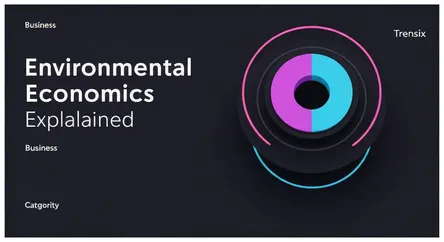Business
Environmental Economics Explained

Discover how environmental economics blends economic principles with ecological concerns to address pollution, climate change, and sustainable resource use.
What is it?
Environmental economics is a subfield of economics that focuses on environmental issues. It examines the economic effects of environmental policies and seeks to balance economic activity with environmental preservation. This field addresses market failures like externalities, where the production or consumption of a good affects a third party without compensation—pollution being a classic example. It develops methods to value natural resources and ecosystems, such as clean air and water, to incorporate them into economic decision-making. Key tools include cost-benefit analysis, carbon pricing, and emissions trading schemes.
Why is it trending?
This field is gaining prominence due to the escalating climate crisis and growing public demand for sustainable practices. As extreme weather events become more frequent, governments and corporations face increasing pressure to act. Concepts from environmental economics are central to major policy discussions, including carbon taxes, green investments, and the transition to a circular economy. The rise of ESG (Environmental, Social, and Governance) investing has also pushed companies to quantify and mitigate their environmental impact, making this economic discipline more relevant than ever.
How does it affect people?
Environmental economics directly influences daily life and finances. Policies like carbon taxes can increase the cost of gasoline and heating, while subsidies for electric vehicles or solar panels can lower them. Regulations on industrial pollution can lead to cleaner air and water, improving public health and quality of life in communities. It can also shape job markets by creating new opportunities in green industries like renewable energy and sustainable agriculture. Ultimately, it aims to create incentives that guide individuals and businesses toward choices that are both economically sound and environmentally responsible.